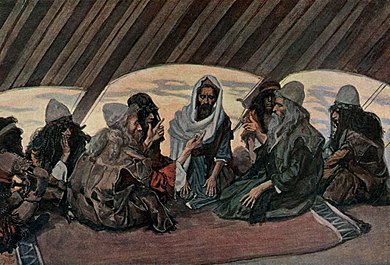The Parasha’s name, “Yitro,” means “Jethro,” and it appears in Exodus 18:1.
When Jethro, Moses’ father-in-law, learns of the amazing miracles that God did for the Israelites, he travels from Midian to the Israelite camp with Moses’ wife and two boys. To help him in his duties of ruling and dispensing justice to the populace, Jethro counsels Moses to form a hierarchy of magistrates and judges.
Near Mount Sinai, where they are taught that God has selected them to be His “kingdom of priests” and “holy nation,” the children of Israel set up camp. The populace replies, “All that God has spoken, we shall do,” in their own words.
The Giving of the Torah takes place at the foot of Mount Sinai on the sixth day of the third month (Sivan), seven weeks after the Exodus. Moses is instructed to go up the mountain by God, who descends amid thunder, lightning, smoke, and shofar blasts.
God gives the Israelites the Ten Commandments, instructing them to honor their parents, observe Shabbat, worship only God, refrain from idolatry, refrain from committing adultery, refrain from murder, refrain from stealing, refrain from giving false testimony, and refrain from coveting the possessions of others.
The people implore Moses to receive the Torah from God and deliver it to them, crying out to him that the revelation is too strong for them to handle.
Parashat Yitro is the shortest of the weekly Torah portions in the Book of Exodus and is also one of the shortest parashiyot in the Torah. It consists of 75 verses, 1,105 Hebrew words, and 4,022 Hebrew characters.
On the seventeenth Sabbath following Simchat Torah, usually in January or February, Jews read it. On the first day of the Jewish holiday of Shavuot, which honors the delivery of the Ten Commandments, Jews also read Exodus 19:1–20:23 as a Torah reading.
Yitro
Isaiah 6:1-7:6
“Holy, holy, holy!
The LORD of Hosts!
His presence fills all the earth!”
“Woe is me; I am lost!
For I am a man of unclean lips-b
And I live among a people
Of unclean lips;
Yet my own eyes have beheld
The King LORD of Hosts.”
“Now that this has touched your lips,
Your guilt shall depart
And your sin be purged away.”
‘Hear, indeed, but do not understand;
See, indeed, but do not grasp.’
Stop its ears,
And seal its eyes—
Lest, seeing with its eyes
And hearing with its ears,
It also grasp with its mind,
And repent and save itself.”
“Till towns lie waste without inhabitants
And houses without people,
And the ground lies waste and desolate—
And deserted sites are many
In the midst of the land.
Isaiah 9:5-6
A son has been given us.
And authority has settled on his shoulders.
He has been named
“The Mighty God is planning grace;
The Eternal Father, a peaceable ruler”—
And of peace without limit
Upon David’s throne and kingdom,
That it may be firmly established
In justice and in equity
Now and evermore.
The zeal of the LORD of Hosts
Shall bring this to pass.



















One Response